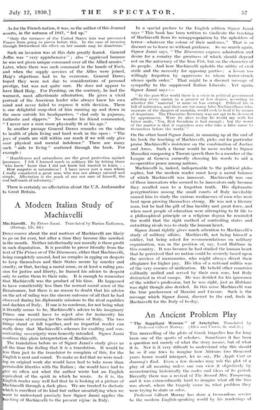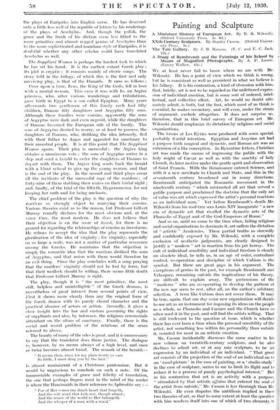An Ancient Problem Play
"The Suppliant Women" of Aeschylus. Translated by Professor Gilbert Murray. (Allen and Unwin, is. and IN.) Tsw. unravelling of the plots of Greek tragedies has for long been one of the sports of scholars. Sometimes it has been a question not merely of what the story means, but of what it is. Nor is it very difficult to understand why this should be so if one tries to imagine how Africans two thousand years hence would interpret, let us say, The Apple Cart or Journey's End. Even a few decades may rob the plot of a play of all meaning unless one can view it objectively by reconstructing historically the codes and ideas of its period. Recently there was a revival of The Second lIrs. Tanoueray, and it was extraordinarily hard to imagine what all the fuss was about, where the tragedy came in, what problem they were trying to state or solve. Professor Gilbert Murray ha.s done a tremendous service to the modern English-speaking world by his renderings of
the plays of Euripides into English verse. Ile has deserved only a little less well of the republic of letters by his renderings of the plays of Aeschylus. And, though the polish, the grace and the finish of his diction scent less fitted to the more pr. live and almost rugged genius of Aeschylus than to the more sophisticated and mundane style of Euripides, it is doubtful whether any other scholar could have translated Aeschylus so well.
The Suppliant Women is perhaps the hardest task to which he has set his hand. It is the earliest extant Greek play ; its plot is cryptic ; it consists mainly of choric songs. The story told in the trilogy, of which this is the first and only surviving play, is that of the Danaids. It tuns as follows :
Once upon a time, Zeus, the King of the Cods, fell in love with a mortal woman. T his once it was with lo, an Argive priestess, who, after various wanderings and tribulations, gave birth in Egypt to a son called Epaphus. Many years afterwards tsvo gentlemen or this family each had fifty children, Danaus fifty daughters and Aegyptus fifty sons. Although these families were cousins, apparently the sons of Aegyptus were dark and even negroid, while the daughters of Danaus favoured the European side of the family. The SOBS of Aegyptus desired to marry, or at least to possess, the daughters of [humus, who, disliking the idea intensely, fled with their father to Argos and appealed for sanctuary to their ancestral people. It is at this point that The Suppliant Women opens. Their plea is successful ; the Argive king obtains a unanimous vote ; the sons of Aegyptus arrive in a ship and send a herald to order the daughters of Danaus to depart with them. The Argivc king sends back the herald With a blunt refusal to give up the young women, and that is the end of the play. In the second and third plays occur all the incidents of the successful rape of the maidens ; of forty-nine of them stabbing their mates on their bridal night ; and, finally, of the trial of the fiftieth, Hyper lllll estra, for not keeping her oath and for being unchaste.
The chief problem of the play is the question of why the maidens so strongly object to marrying their cousins. Various theories exist as to the reason, but Professor Gilbert Murray roundly declares for the most obvious and, at the same time, the most modern. He does not believe that their objection is on the score of incest, for there is no ground for regarding the relationships of cousins as incestuous. Be refuses to accept the idea that the play represents the glorification of the idea of virginity ; for virginity, especially on so large a scale, was not a matter of particular reverence among the Greeks. lie maintains that the objection is simply the romantic idea that the maidens disliked the sons of Aegyptus, and that union with them would therefore be an evil thing. Since the play concludes with a song praying that the maidens' virginity should not be lost by force, but that their wedlock should be willing, there seems little doubt that Professor Gilbert Murray is right.
The play, though it is " the most primitive, the most stiff, helpless and unintelligible " of the Greek (traumas, is nevertheless of great interest from several points of view. First it shows more clearly than any the original form of the Greek drama with its purely choral character and the practical absence of actors or action. Secondly, it gives a close insight into the law and custom governing the rights of suppliants and also, by inference, the religious ceremonials attendant on the altars of sanctuary. Finally, there is the social and moral problem of the relations of the sexes referred to above.
The beauty of many of the odes is great, and it is unnecessary to say that the translator does them justice. The dialogue is, however, by no means always of a high level, and once or twice becomes almost banal. The remark of the herald:—
" It seems then, since for my plain words ye care
So little, I must drag you by the hair."
is almost reminiscent of a Christmas pantomime. But it would be ungracious to conclude on such a note. Of the innumerable examples of grace and felicity of translation, the one that perhaps lingers most in the mind of the reader is where the Handmaids in their reference to,Aphrodite say :—
"For of Her comes the dumb heart that longeth, And the soft word that fails not, though afraid ; And the music of the world to Her belongeth And the whisper of a man with a maid."





































 Previous page
Previous page